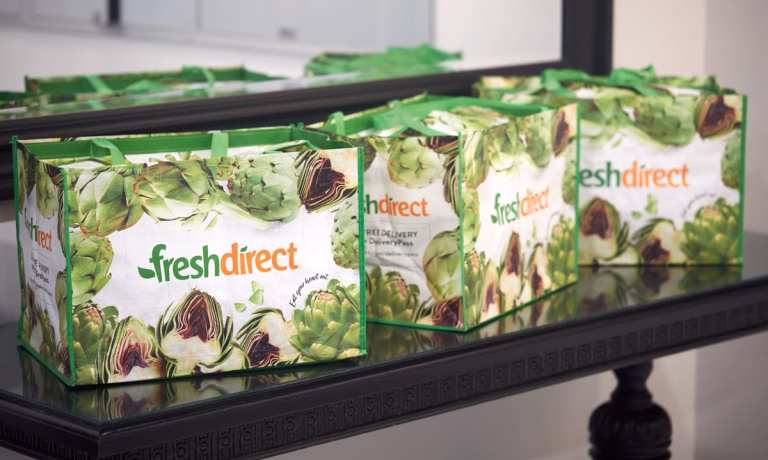FreshDirect Looks To Micro-Fulfillment For Post-Pandemic Expansion

The past year has seen an unprecedented change in grocery habits, with mass adoption of digital and remote alternatives to the traditional in-store shopping journey, as consumers sought out COVID-safe ways to get the foods they needed. No businesses were better positioned to take advantage of this shift than those that had already built out their digital ordering and delivery infrastructures before the outbreak of the virus.
New York-based grocery delivery service FreshDirect, for one, was able to expand its user base and grow its sales. Now, coming off of a strong year, and in the wake of its recent acquisition by Dutch grocery giant Ahold Delhaize, FreshDirect is poised for post-pandemic success.
“This past year we have witnessed a seismic shift in customer behavior toward online grocery,” FreshDirect Chief Operating Officer Timothy Knoll told PYMNTS in an interview. “For FreshDirect, the surge began early, as our ordering data gave us early insight into customer behavior… And we decided early that our goal at FreshDirect was to serve as many customers as possible, keeping hundreds of thousands of people off the streets and out of stores.”
A Quick Pivot Amid The Chaos
Very early on in the pandemic, the company saw consumers’ tastes beginning to shift. Knoll noted, “High-trust categories from baby food to seafood began to rise as customers began preparing more meals at home.”
Responding to these changing needs, the company reconsidered its inventory, making changes to reach a wider audience. These changes included “Temporarily limiting SKUs to products our customs need and want the most, temporarily limiting item count so we could serve as many people as possible, following our consumers to the suburbs and shore areas…, launching Express delivery in the summer of 2020 … deliver[ing] to [customers’] doorsteps within two hours, in a 60-minute window, [and] full year extension of Hamptons service.”
In addition to these changes, Knoll said, the company also bolstered its customer service, “calling customers to offer up time slots and reservations as they opened and fielding customer service emails and chats.” The company also added more short-notice timeslots in select areas across the Northeast and added delivery fee-less pickup in high-demand markets. Plus, the company announced a number of social impact initiatives, including partnering with the New York Common Pantry (NYCP) and working with New York City legislature to launch Operation 5-Borough Food Drive.
Differentiating In A Crowded Space
“As a pure-play online retailer, we have a unique and unmatched ability to understand the ever-changing buying habits of our customers, spot changes in trends quickly and react to them in real-time,” Knoll said. “Customers often start filling up their online shopping carts days in advance, giving us high visibility into new trends.”
This access gives the company the opportunity to meet consumers’ most pressing needs quicker than brick-and-mortar-native competitors. Additionally, FreshDirect is positioned to make decisions based on data from every step of the buying journey. In Knoll’s words, “Our proprietary infrastructure allows for intimate, more personalized ownership of the customer experience through sourcing, picking, packing and ultimately, doorstep delivery.”
Online grocery is traditionally thought to be primarily the purview of dry goods and non-food items. While this belief is backed by data — PYMNTS research has found that over 21 percent of all consumers who buy non-food grocery items such as shampoo, first-aid items and cleaning products do so online, while well over 14 percent who buy packaged food products do so online — FreshDirect’s focus on freshness (right there in the name) gives it the opportunity to provide remotely products that consumers may otherwise have turned to in-store shopping to obtain.
“Unlike other online grocery stores which focus on center-of-store goods and tend to struggle in fresh food categories,” Knoll said, “our supply chain and distribution network are specifically designed to deliver the highest quality produce, seafood, meat, poultry, and prepared foods.”
Leveraging MFCs For Rapid Expansion
Micro-fulfillment centers (MFCs), mini warehouses that fulfill several thousand orders per week, are a key part of Ahold Delhaize’s 2021 strategy. CEO Frans Muller shared on a call with analysts, “A multiple-MFC network along the East Coast is for us the best solution. We can react very fast with those MFCs because you can build them very fast — the buildings are already there.”
FreshDirect is a key part of the grocery giant’s MFC plan. Knoll shared, “Micro-fulfillment is central to our expansion strategy and underscores our industry innovation. The technology allows us to turn our existing regional facilities into high-velocity automated distribution centers, speeding our expansion and growth into in our existing service footprint.”
The expansion will give the grocer an opportunity to take advantage of more consumers’ changed habits. PYMNTS data find that 24 percent of consumers who shop online prefer to have their orders shipped to them instead of picking them in-store and that the share of consumers shifting to online grocery shopping has quadrupled since before the pandemic.
“Online grocery has been the biggest trend by far this year, and from where we stand, demand is expected to continue,” said Knoll. “We expect to grow to meet customers’ need for ease, speed and fresh quality food.”
Read More On Retail:
- Amazon’s Prime Day Leaves Walmart+ Deal Days in Summer Haze
- Prime Day Sales Climb 11% as Shoppers Spend $14 Billion, Setting Record
- Vera Bradley CEO: Customization and Interactive Experiences Transform In-Store Journey
- Petco Names Former Five Below Chief Joel Anderson as CEO